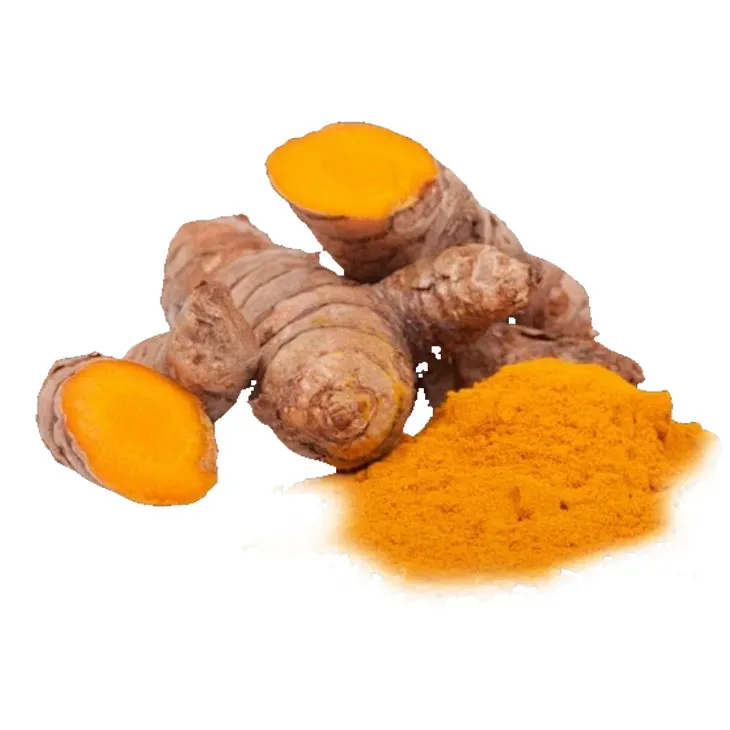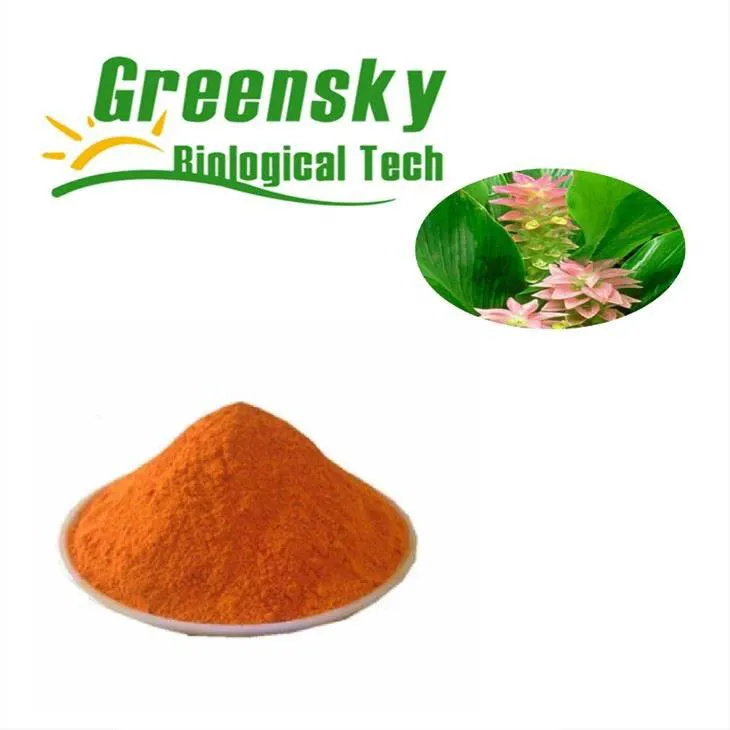- 0086-571-85302990
- sales@greenskybio.com
Read our comprehensive primer on high - quality organic curcumin.
2024-12-13

Introduction to Curcumin
Curcumin is a golden - colored compound that is derived from turmeric. Turmeric has been used for centuries in traditional medicine, especially in Asian cultures. Curcumin itself has a wide range of potential health benefits, which has led to its growing popularity in the modern health and wellness community.

Health Benefits of Curcumin
Heart Health
One of the significant areas where curcumin may play a crucial role is in promoting heart health. There are several mechanisms through which it could potentially contribute.
Reducing Cholesterol Levels: Some studies suggest that curcumin may help in reducing the levels of LDL (low - density lipoprotein), which is often referred to as "bad" cholesterol. By interfering with the biosynthesis of cholesterol in the liver, curcumin might help in maintaining a more favorable cholesterol profile.
For example, in animal studies, curcumin supplementation has shown a decrease in total cholesterol and LDL - cholesterol levels. However, more research in humans is needed to confirm these effects.
Improving Blood Circulation: Curcumin may also have an impact on improving blood circulation. It has anti - inflammatory properties, and chronic inflammation in the blood vessels can lead to endothelial dysfunction, which is associated with poor blood circulation. By reducing inflammation, curcumin can potentially help in maintaining the integrity of the blood vessel walls and improving the overall function of the cardiovascular system.
Other Health Conditions
Curcumin has also been studied for its potential role in treating other health conditions.
- Arthritis: The anti - inflammatory properties of curcumin make it a potential candidate for managing arthritis. Inflammation is a key factor in the development and progression of arthritis, and curcumin's ability to reduce inflammation may help in alleviating pain and improving joint function. Some studies have shown that curcumin supplementation can be as effective as non - steroidal anti - inflammatory drugs (NSAIDs) in reducing arthritis symptoms, with the added advantage of having fewer side effects.
- Cancer: There is growing research interest in curcumin's potential anti - cancer properties. It may work at various stages of cancer development, from preventing the initiation of cancer cells to inhibiting their growth and metastasis. For instance, curcumin has been shown to modulate various signaling pathways involved in cancer cell survival and proliferation. However, it is important to note that while curcumin shows promise in laboratory and some pre - clinical studies, more extensive clinical trials are required to determine its effectiveness as a cancer treatment.
- Brain Health: Curcumin may also have implications for brain health. It has been studied for its potential role in preventing neurodegenerative diseases such as Alzheimer's and Parkinson's. Curcumin can cross the blood - brain barrier, and its antioxidant and anti - inflammatory properties may help in protecting neurons from damage. Some studies in animal models have shown that curcumin can reduce the accumulation of amyloid - beta plaques, which are characteristic of Alzheimer's disease.

Organic Curcumin Production
When it comes to high - quality organic curcumin, strict production standards are adhered to in order to ensure maximum purity and potency.
Source of Turmeric
The quality of the turmeric from which curcumin is extracted is of utmost importance. Organic turmeric is grown without the use of synthetic pesticides, fertilizers, or genetically modified organisms (GMOs). Organic farming practices not only ensure a more natural and pure product but also have environmental benefits.
For example, in India, which is one of the largest producers of turmeric, organic turmeric farms follow specific guidelines to maintain the integrity of the crop. These farms often use natural fertilizers like compost and practice crop rotation to maintain soil fertility and prevent the build - up of pests and diseases.
Extraction Process
The extraction of curcumin from turmeric is a crucial step in ensuring high - quality organic curcumin. There are different extraction methods, but the goal is to obtain a pure and concentrated form of curcumin while maintaining its bioactivity.
One common method is solvent extraction. However, in organic curcumin production, the solvents used must be compliant with organic standards. For example, supercritical CO2 extraction is a more advanced and environmentally friendly method that can be used to extract curcumin. This method allows for a more precise extraction, resulting in a higher - quality product with fewer impurities.

Forms of Curcumin
Curcumin comes in various forms, each with its own advantages and considerations when it comes to choosing the most suitable one.
Capsules
Capsules are a popular form of curcumin supplementation. They offer convenience and ease of use. The curcumin in capsules is usually in a powdered form, encapsulated in a gelatin or vegetarian - friendly capsule shell.
Advantages:
- They are easy to swallow, making them a suitable option for those who have difficulty taking powders or tinctures.
- The encapsulation helps to protect the curcumin from degradation by environmental factors such as light, air, and moisture, which can enhance its stability and shelf - life.
Powders
Curcumin powders are another option. They can be added to food or beverages, allowing for more flexibility in consumption.
Advantages:
- They can be easily incorporated into smoothies, juices, or even cooking recipes. For example, adding a teaspoon of curcumin powder to a morning smoothie can be a convenient way to get your daily dose of curcumin.
- Some people prefer powders because they can control the amount they consume more precisely compared to capsules.
Tinctures
Tinctures are liquid extracts of curcumin. They are usually made by soaking curcumin - rich plant material in alcohol or a glycerin - based solvent.
Advantages:
- Tinctures are often absorbed more quickly by the body compared to capsules or powders. This is because the liquid form can be more easily digested and absorbed in the digestive tract.
- They can be added to a small amount of water or juice and consumed, which is convenient for those who do not like swallowing pills or powders.

Selecting the Most Suitable Form
When choosing the most suitable form of curcumin, several factors need to be considered.
Personal Preferences
Your personal preferences play a significant role. If you have difficulty swallowing pills, then tinctures or powders might be a better option for you. On the other hand, if you prefer a more convenient and portable option, capsules could be the way to go.
Intended Use
The intended use of curcumin also matters. For example, if you are looking to add curcumin to your cooking or daily smoothies, then a powder form would be more appropriate. If you are aiming for a quick - acting supplement for a specific health condition, a tincture might be more suitable due to its faster absorption.
Quality and Purity
Regardless of the form, it is essential to ensure the quality and purity of the curcumin product. Look for products that are third - party tested for purity and potency. Organic certifications can also be an indicator of a high - quality product.

The Latest Research Findings on Curcumin
Research on curcumin is constantly evolving, and new findings are emerging regularly.
Recent Clinical Trials
In recent clinical trials, curcumin has shown promising results in various areas.
For example, in a study on patients with type 2 diabetes, curcumin supplementation was found to improve insulin sensitivity. This could potentially lead to better blood sugar control in diabetic patients. Another trial focused on patients with inflammatory bowel disease (IBD). The results indicated that curcumin may help in reducing inflammation in the gut and improving the symptoms associated with IBD.
Future Research Directions
There are still many areas where further research on curcumin is needed.
One area of interest is in developing more effective delivery systems for curcumin. Since curcumin has low bioavailability, finding ways to enhance its absorption in the body could improve its effectiveness as a therapeutic agent. Another direction is in exploring the potential of curcumin in combination with other drugs or natural compounds. For example, combining curcumin with certain chemotherapy drugs may enhance their anti - cancer effects while reducing their side effects.
FAQ:
What are the benefits of high - quality organic curcumin for heart health?
High - quality organic curcumin can potentially reduce cholesterol levels and improve blood circulation, which are important aspects of promoting heart health. It may have antioxidant and anti - inflammatory properties that contribute to the overall well - being of the heart.
How is organic curcumin produced to ensure maximum purity and potency?
Organic curcumin production adheres to strict standards. This includes using organic farming methods for turmeric cultivation, careful extraction processes to obtain the curcumin compound, and quality control measures to eliminate impurities and ensure a high level of potency.
What are the differences between the various forms of curcumin like capsules, powders, and tinctures?
Capsules are convenient for those who prefer a pre - measured dose and easy swallowing. Powders can be more versatile as they can be added to foods or drinks. Tinctures are liquid extracts and may have a faster absorption rate. However, the effectiveness can also depend on factors such as the quality of the product and individual metabolism.
What are the latest research findings on curcumin in treating health conditions?
Recent research has explored curcumin's potential in treating various health conditions. For example, it has shown promise in reducing inflammation - related diseases, and there are ongoing studies regarding its role in neurodegenerative diseases, cancer prevention, and management of metabolic disorders. However, more research is still needed to fully understand its efficacy and safety in these areas.
How can one select the most suitable form of curcumin?
When selecting the most suitable form of curcumin, consider factors such as personal preference, ease of use, and any specific health needs. If you have trouble swallowing pills, a powder or tincture might be better. If convenience is key, capsules could be the way to go. Also, consult with a healthcare provider, especially if you are taking other medications or have underlying health conditions.
Related literature
- The Role of Curcumin in Health and Disease"
- "Organic Curcumin: Production and Quality Assurance"
- "Curcumin Forms and Their Bioavailability"
- ▶ Hesperidin
- ▶ citrus bioflavonoids
- ▶ plant extract
- ▶ lycopene
- ▶ Diosmin
- ▶ Grape seed extract
- ▶ Sea buckthorn Juice Powder
- ▶ Beetroot powder
- ▶ Hops Extract
- ▶ Artichoke Extract
- ▶ Reishi mushroom extract
- ▶ Astaxanthin
- ▶ Green Tea Extract
- ▶ Curcumin Extract
- ▶ Horse Chestnut Extract
- ▶ Other Problems
- ▶ Boswellia Serrata Extract
- ▶ Resveratrol Extract
- ▶ Marigold Extract
- ▶ Grape Leaf Extract
- ▶ blog3
- ▶ blog4
- ▶ blog5
-
Pure 85% Tomentil Extract.
2024-12-13
-
Uridine-5'-monophosphate Disodium salt
2024-12-13
-
Europen Bilberry Extract
2024-12-13
-
Eyebright Extract
2024-12-13
-
Carrageenan Extract Powder
2024-12-13
-
Hericium erinaceus extract powder
2024-12-13
-
Wheat Germ Extract
2024-12-13
-
Lemon Balm Extract
2024-12-13
-
Okra Extract
2024-12-13
-
Black Pepper Extract
2024-12-13
-
Baicalin
2024-12-13





















